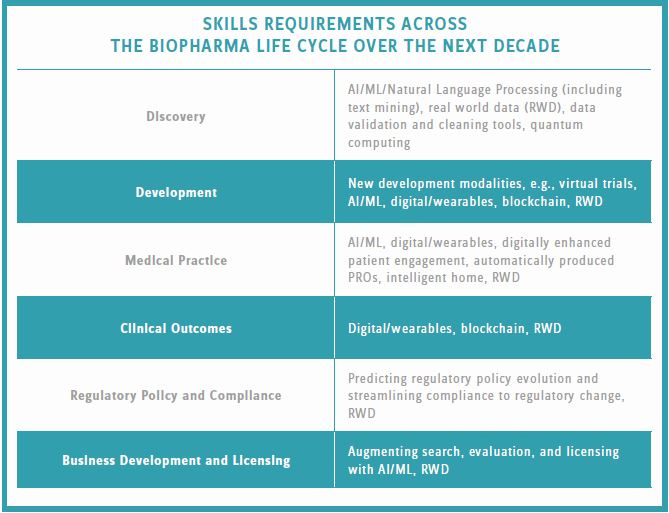How Biopharma Can Compete For Top Tech Skills
By John Wise
 The next 10 years is likely to see massive changes for almost every aspect of the biopharmaceutical and life sciences industry as companies look to continue making breakthroughs and developing life-saving therapies for a host of deadly diseases. A key change will be the continued adoption of new technology such as AI, something that will significantly alter the skillsets required from researchers, particularly those in data science roles.
The next 10 years is likely to see massive changes for almost every aspect of the biopharmaceutical and life sciences industry as companies look to continue making breakthroughs and developing life-saving therapies for a host of deadly diseases. A key change will be the continued adoption of new technology such as AI, something that will significantly alter the skillsets required from researchers, particularly those in data science roles.
Across the value chain from early discovery to business development, companies will need a range of data scientists and technology experts who are proficient with everything from AI and machine learning (ML) to data analytics, blockchain management, and even quantum computing. Already, savvy biopharma firms are looking at the rate of change around the technology-science nexus and exploring how best to improve their workforce to remain ahead of the curve. Over the next decade, there will be the need for a marked increase in training and development as firms build the in-house capabilities to unlock the value of these technologies. However, there are numerous challenges to be overcome before this goal can become a reality.
CAPTURING THE ‘COOL’ FACTOR
As digital transformation continues apace across virtually all industries, one of the biggest challenges facing life sciences organizations is that they’re no longer just competing against each other for talent; banks and financial technology firms, retailers, and tech giants like Google and Amazon are all looking for those employees with an aptitude for digital technology. Many other industries, particularly the tech sector, have deeper pockets and can offer salaries designed to tempt the cream of global talent at a time when biopharma and life sciences firms need more varied technical expertise than ever before. Indeed, we expect to see some of the technology “giants” swallowing some traditional research-based biopharma companies in the coming years.
There is also the broader challenge of society’s largely negative perception of the biopharma industry caused by many serious and ongoing issues, such as an apparent lack of transparency and high drug prices. These negative associations with working in the sector have been a problem for some time now — and there has been little progress.
As the industry attempts to become more patient-centric, this fundamental trust issue needs to be addressed. In part, societal trust will be solicited by the delivery of cures for previously untreatable conditions, using gene editing and cell therapy. These breakthrough treatments are stimulating more positive thinking in society and an emerging appreciation of the impressive biomedical capabilities of the industry. However, this change is likely to be relatively slow, and companies need to think of other ways to ensure the talent shortage doesn’t become a barrier to innovation.

TO GET THE BEST, YOU NEED TO INVEST
Rather than trying to attract the best talent on salaries alone, the industry needs to focus on other ways to distinguish itself, beginning with the opportunity to make a difference by contributing to the development of life-saving therapies. Beyond this, biopharma companies need to develop a reputation as an employer who truly believes in constantly educating and improving their employees. This approach has multiple benefits including increasing employee loyalty, enabling better succession planning, and boosting staff morale. On top of that, it’s often cheaper and quicker to train an existing researcher than pay recruitment fees and wait to find and to coax someone more established to move from a competitor.
Nor do companies have to face this challenge alone. As part of its mission to help members, The Pistoia Alliance runs numerous ongoing training programs, such as its Centre of Excellence (CoE) for AI in Life Sciences. The CoE includes both virtual and physical coworking spaces and has been designed to enable life science professionals to share best practices and learn how best to apply AI and machine and deep learning to R&D wherever they are in the world. It aims to help educate researchers on the role of AI in the “lab of the future,” while also facilitating collaborations by allowing companies to share their expertise and knowledge. The alliance runs several groups in other areas such as blockchain and data mining.
Collaborating to ensure the industry is a leader in cutting-edge technologies will require a major focus on developing shared standards, processes, and platforms at the precompetitive stage. By working together, companies can ensure their workforces are equipped to deal with the changes set to upend the industry over the coming decade. Moreover, operating at the cutting edge of new technology will help Big Pharma shed some of its reputational issues and leapfrog other industries when it comes to attracting the best talent.
JOHN WISE is a consultant at The Pistoia Alliance, a global not-for-profit members’ organization focused on lowering barriers to R&D innovation by providing a legal framework to enable straightforward and secure precompetitive collaboration between more than 100 global members.
